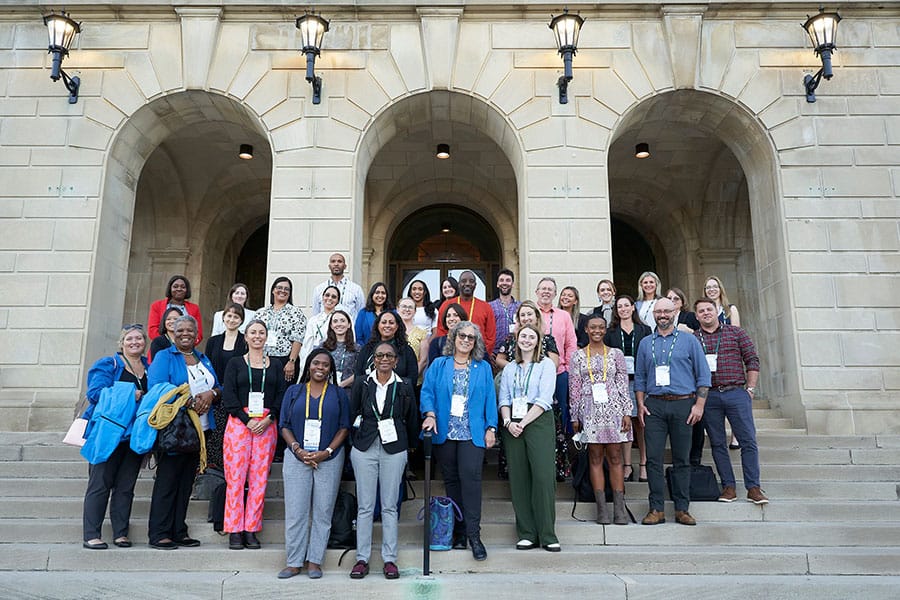Public Health Partners Build Network for Change at PHIG Regional Hub Convening in Philadelphia
Success StoriesWhen most people think of infrastructure, they tend to think of things like roads, bridges, and power lines. When it comes to public health infrastructure, progress is often driven through something harder to see yet equally essential: relationships. On October 4 and 5, 47 individuals representing region 2 and 3’s local and state health departments, Public Health Institutes, Public Health Training Centers, and Public Health Infrastructure Grant (PHIG) national partners gathered in Philadelphia, Pennsylvania to share expertise, discuss common challenges, and identify opportunities for collaboration. This marks the second PHIG Regional Hub convening within a larger series, all of which are designed to help construct the sustainable relationship infrastructure that public health professionals need to address current and emerging population health needs.

The Public Health Management Corporation (PHMC) hosted the gathering. PHMC serves as the National Network of Public Health Institutes’ regional hub for the U.S. Virgin Islands, Puerto Rico, New York, New Jersey, Pennsylvania, Delaware, Washington D.C., Virginia, Maryland, and West Virginia. Five spoke organizations support the hub: The Center for Health Equity & Wellbeing, NJ’s Public Health Institute; the Institute for Public Health Innovation, based in Washington D.C.; Public Health Solutions; Puerto Rico Public Health Trust; and West Virginia University Health Affairs Institute.
Key Takeaways
Highlights from the PHIG Regional Hub Convening included:
- A full-group SWOT (Strengths, Weaknesses, Opportunities, Threats) analysis for each of the PHIG focus areas: Workforce, Foundational Capabilities, and Data Modernization. This led to a larger conversation on how to best leverage what works in one area and apply that to others. Attendees uplifted the need for a shared repository for resource-sharing and communication.
- A panel discussion with representatives from Puerto Rico and the U.S. Virgin Islands provided a deep dive into what partnerships between public health institutes and health departments can look like in practice.
- Ample opportunities to network, share ideas, and make connections.
Attendees and partners appreciated the diverse range of speakers who addressed critical public health topics. A spoke partner shared, “I loved the diversity among the different speakers, how they spoke on different topics on the curve, and how they captured all of our interests. I hope we can continue to capture this breadth going forward.” One speaker, Dr. Christopher J. King, the Dean of Georgetown University School of Health, had an especially profound impact through his presentation on cultural humility, challenging attendees to reckon with racism and bias within our systems and ourselves.
Next Steps
A post-event survey helped to validate the success of the event while providing guidance for future convenings. Respondents showed high satisfaction overall, highlighting the event’s role in improving their understanding of the technical assistance process and expressing a commitment to translating these learnings into action in their respective organizations.
Kristine Gonnella, PHMC Managing Director of Strategy Development, reflects on the Regional Convening, sharing that “We are excited to work with public health partners to build a public health training infrastructure that supports equitable access to resources and training materials available to all state, local and territorial health departments.” Building on the momentum of their convening, PHMC is working to support regions 2 and 3’s overarching goal of creating better regional systems and opportunities for partners to connect, collaborate, and learn from each other’s experiences. The following are a few ways they are progressing toward this goal:
- Creating a region 2 and 3 directory for their partners to leverage as they build connections.
- Conducting a thematic analysis of the SWOT session data to reveal common themes across topic areas, organizations, and states/territories. This analysis will serve as a guidepost for future collaboration, helping to bridge gaps and strengthen the collective knowledge base within the region. The path forward may involve drafting a white paper or encouraging similar SWOT sessions at other convenings, with the intention of sparking a nationwide dialogue across regions and recipients.
The next PHIG Regional Hub Convening will be held in Atlanta, Georgia on October 23-24 and hosted by the Mississippi Public Health Institute, the region 4 Hub. Through these convenings and continued collaboration within and across regions, hubs, and their partners are creating something equally as vital as physical infrastructure to support healthier communities: a network for change.